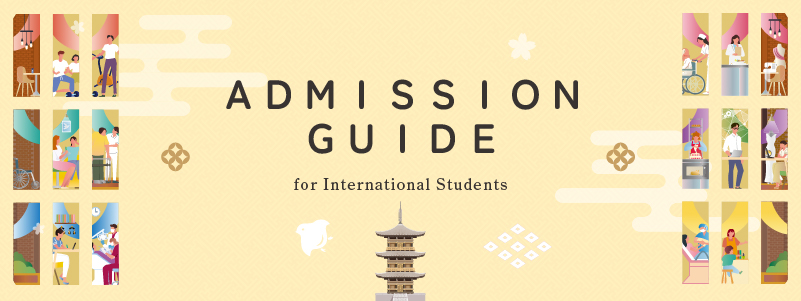
International Students Admission Guide
Kyoto Koka University / Kyoto Koka College
(Name to be changed, scheduled for April 2026)
A university that aims to create "Health" and "Future" for the people
For more than 80 years, Kyoto Koka University has been committed to education based on the Buddhist spirit. We emphasize the "Truthful Heart." A heart of compassion. A heart that is more than willing to help.
With this philosophy as a basis, we practice education that is more attuned to the needs of each student with the aim of realizing a future of "Well-Being" in which all people can live healthy lives.
An environment that closely supports international students
1. A Robust Support System
We have a seven member support team, including class advisors and staff from the Center for International Exchange, so each international student is comfortable in their daily life. For language support, in addition to regular classes such as “Japanese Language,” “Japanese Circumstances,” and “Business Japanese,” there is an extracurricular activity called “Japanese Language Community” held twice a week, in which “Japanese Peer Supporters” provide learning support. In addition, the Employment Support Center provides courteous and individualized support for international students seeking employment in Japan.
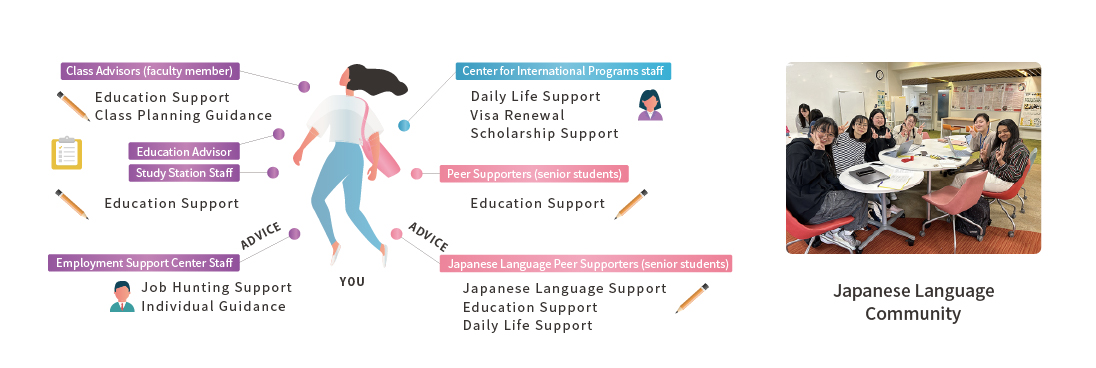
2. Learning about Traditional Japanese Culture
At Koka, students will learn about Japan's traditional culture as part of their compulsory studies. Through experience-based learning, students will acquire techniques in flower arrangement, tea ceremony, etiquette, calligraphy, and kimono dressing. Leading to a deeper understanding of each topic. There are also a wide range of traditional culture clubs.
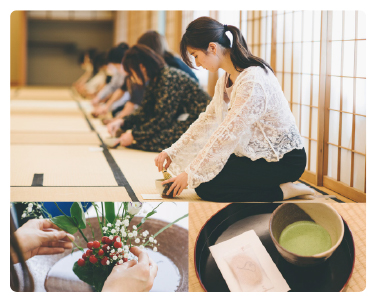
3. Many International Exchange and Volunteer Opportunities
The University holds events such as the “New Student Welcome Party” as an opportunity for international students to make connections with each other.
We also support students in making friends through regular events such as the “Multicultural Lounge,” an exchange event with Japanese students, and the “International Exchange Gathering.”
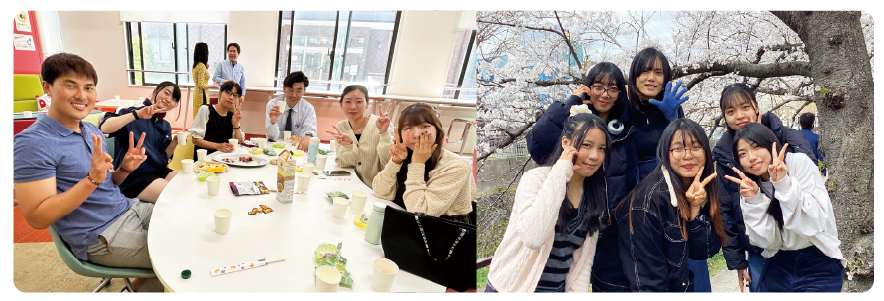
Along with club activities, our unique free-participation study group “Mana Booo” is also very popular. Students work with faculty advisors and other students, and there are plenty of opportunities to meet others with similar interests and to learn together.
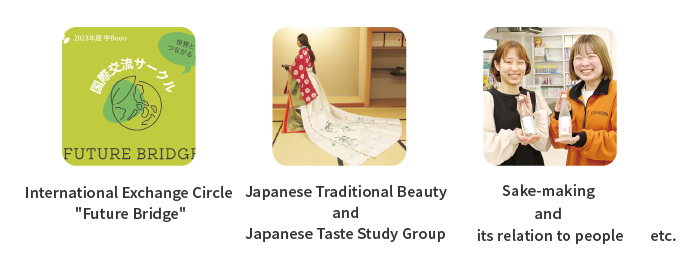
We also value our local community and offer a wide range of volunteer opportunities to connect with the Kyoto community. Many international students are registered with the “Koka Liaison Club” and are active in local events, such as Kids' Cafeterias, the Kyoto Marathon, and more. Students are able to deepen their relationships not only with each other but also with the local community.
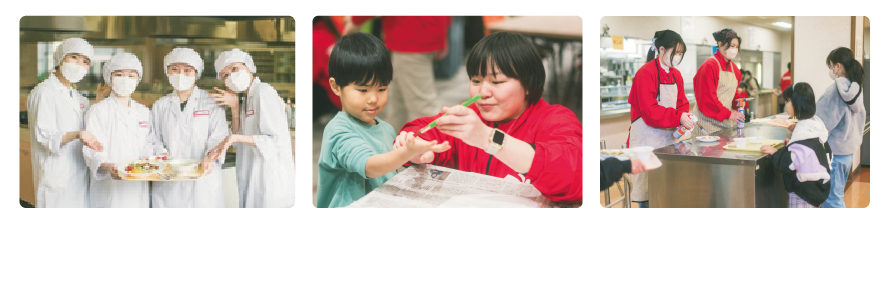
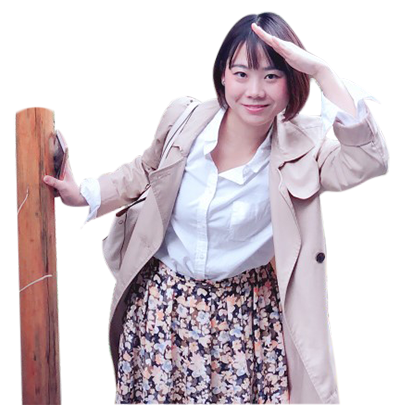 |
Kyoto Koka being a Buddhist university allowed me to gain a deeper understanding of Buddhism and see life and the world from a new perspective. At Koka, I could feel the delicate beauty unique to a women's university. I hope you too will come and enjoy a wonderful student life in Kyoto, a city with a deep history and a sense of modern fashion! Zou Jiaojiao from China. Graduated from Graduate School of Nursing Science |
Faculty / Department
★Departments that offer international student admission
Click the ▶︎ below to open the information
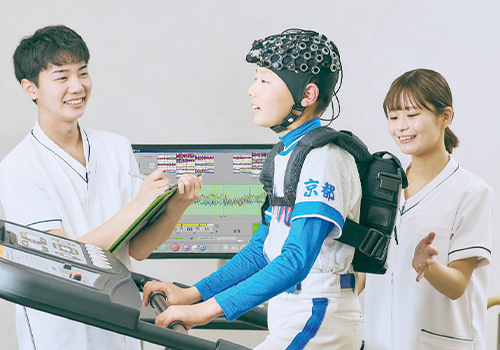
▶︎Click here for the homepage
Occupational Therapy Major – Department of Social Work and Rehabilitation Science
Aiming to become an occupational therapist who can work with children to the elderly and even in disaster situations
The program trains occupational therapists—professionals who provide treatment to people who are unable to perform work due to illness, injury, dementia, or various other reasons. Occupational therapists provide treatment not only for physical health, but also for mental health. We develop and train our students to care about each and every patient.
▶︎After passing the national examination, you can obtain a medical visa and work in Japan!
1.As a member of the faculty, we have specialized occupational therapists (special needs education) which there are only 13 * in Japan. *As of March 2025
Learn practical child rehabilitation
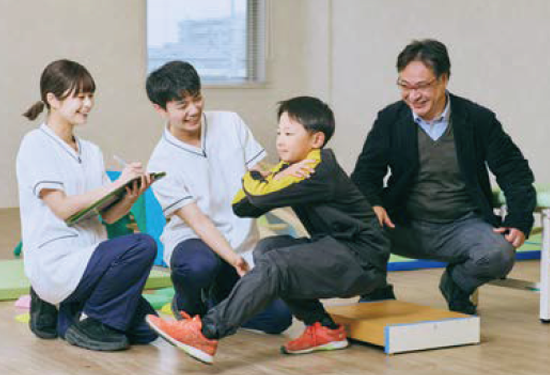
In addition to regular occupational therapy, we offer occupational therapy through "play," "cooking," "music," and other activities that nurture children's spontaneity and enable them to build success experiences. Students learn the skills necessary to support children's "mind," "body," and "life" from various perspectives. The program trains occupational therapists who are strong in supporting children with developmental disabilities.
2.Learn community disaster rehabilitation and safety crisis management, and become an occupational therapist who can play an active role in disaster relief.
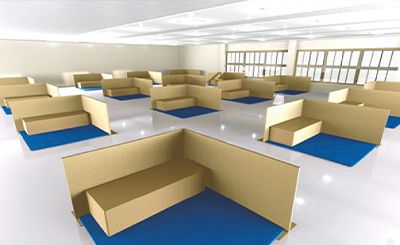
The perspective of an occupational therapist is needed in various disaster relief settings. In the Community Disaster Rehabilitation class, students gain the ability to prepare for disasters and respond flexibly in disaster relief through experiences such as sleeping on cardboard beds in evacuation centers and learning to cook for disaster situations.
3.On-site hospital training at an overseas university
Learn international rehabilitation and become an occupational therapist who can work worldwide
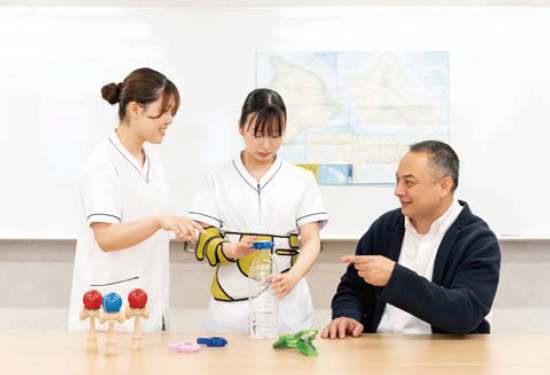
In the midst of globalization, occupational therapy targets people of diverse nationalities and cultures, and therapists work alongside international professionals. This is why our university focuses on developing human resources who can work not only in the medical welfare and educational fields but also in the private sector and international organizations. In the International Rehabilitation class, students travel to Singapore to attend classes in English and participate in practical training to visit local hospitals to acquire a broad and international viewpoint.
*Attendance is not mandatory.
4.Help students overcome their weak areas and lead each student to success
Early Clinical Practice and National Examination Preparation
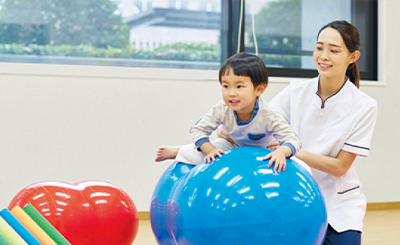
Comprehensive clinical training, which is often conducted in the fourth year at other training schools, is incorporated into the curriculum of the third year at our school. This allows students to concentrate on preparing for the national examination from the early stages of the fourth year. In terms of preparation for the national examination, we provide tailored guidance to each individual student from the first year to help them pass the exam.
▶︎SUBJECT PICK UP!
Learn to rebuild patients' lives in a practical way
Kyoto Traditional Culture Occupational Therapy Techniques
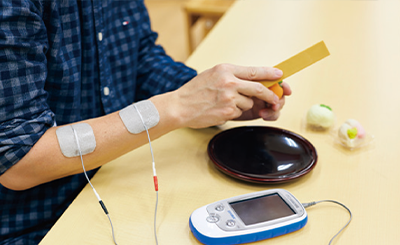
Students acquire basic therapeutic knowledge and skills through work activities utilizing Kyoto's traditional culture. Students learn about "rehabilitation" i.e. "reconstruction of one's life" in a practical manner, through analyzing the structure of work techniques and dividing them into "tools, materials, and processes." This allows students to develop the ability to perceive work techniques from various perspectives.

▶︎Home Page
Faculty of Nursing, Social Work and Rehabilitation Science Department of Social Work and Rehabilitation Science Speech-language Hearing Therapy Major
Become a speech-language pathologist who supports the joy of communication.
The program trains speech therapists—rehabilitation professionals who assist people with speech, hearing, and swallowing disorders. Through clinical practice and by learning from professionals who are active in the field, our students will be able to support medical care and collaborate with various professionals.
1.Learn directly from doctors and speech therapists active on the front lines
of the medical field
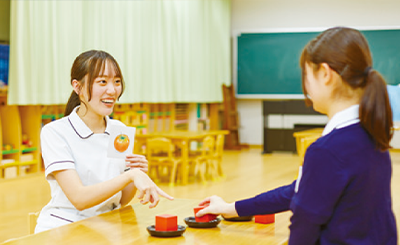
Learn from professionals active in the medical field about the current state of the medical field and the medical professionals who work there, as well as the importance and role of speech therapists. In addition, students will have plenty of opportunities to interact directly with people with speech and hearing disabilities and their families.
2.Plenty of opportunities to learn about clinical practice in real-life settings
Exercises and practical training in our on-campus clinic
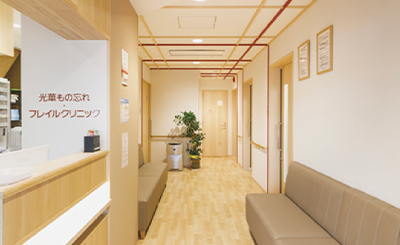
The Koka Memory Loss and Frail Clinic is a clinic located on campus for dementia and frail prevention, headed by a full-time faculty member (physician) of the Department of Speech-language Hearing Therapy. Faculty members of this major are involved in medical treatment and examinations as speech therapists and physicians. The clinic is also used as a place for student exercises and practical training, allowing students to experience and learn about real-life local medical care and interprofessional work firsthand.
3.Become a specialist who can respond to team medical care
Excellent education through collaboration with other departments for multidisciplinary cooperation
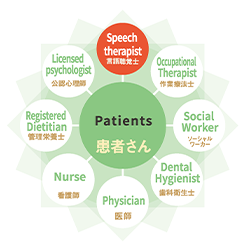
Teamwork with other disciplines is essential for speech therapists. Our university is one of the best in the Kyoto and Shiga areas for training professionals in a wide range of fields, and we offer a full range of education for cooperation among multiple professions. The cross-faculty curriculum allows students to learn from each other, transcending departmental boundaries, and fosters the practical skills necessary to be a member of a team medical care system.
4.Aiming for all students to take and pass the national examination
Great support for the national examinations
From the first year, lessons and preparation for national examinations are linked to deepen basic academic skills and understanding of specialized subjects in a cyclical manner. In addition, teachers in charge of the course regularly check the progress of students and provide individual guidance. From the third year, students are able to overcome areas of weakness through small-group remedial classes tailored to each student's level of proficiency.
After graduation, we continue to provide personal counseling and post-graduation seminars to support students in clinical work, graduate school, and those aiming to re-enter the workforce, or re-taking the national examinations.
▶︎TOPICS
Food Support Activities for the Elderly and People with Disabilities
KOKA Orange Supporters
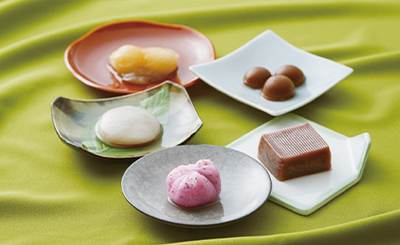
Students are involved in educational events aimed at local residents held at day services and frailty prevention classes to prevent the deterioration of oral functions of the elderly and disabled and to raise awareness of the need to continue eating delicious and safe foods long into people's twilight years.
We are also working hard to develop Japanese sweets that are easy for the elderly and disabled to swallow in collaboration with companies and other departments.
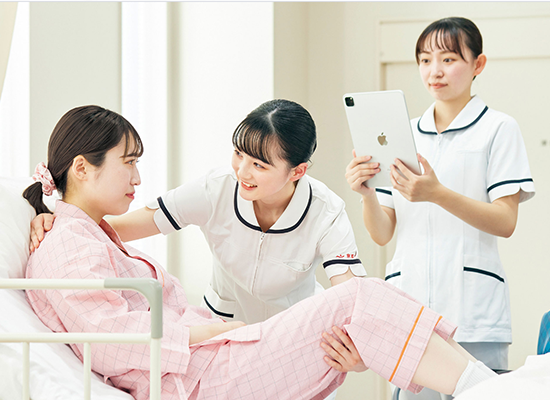
▶︎Home Page
Faculty of Nursing, Social Work and Rehabilitation Science Department of Nursing
Become a nurse who can care for themselves as well as others to provide quality support for others' well-being
Characterized by its nursing education based on the Buddhist teachings, which value the school motto “compassion.” In addition to becoming licensed nurses, students are also eligible to become certified public health nurses or licensed school nurses.
▶︎After passing the national examination, you can obtain a medical visa and work in Japan!
1.Cultivating a rich humanity
Our unique "Buddhist Nursing"
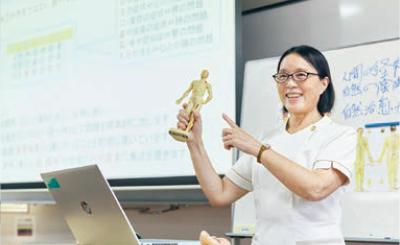
Chinese Medicine
Through unique subjects based on the Buddhist spirit, students will learn various ways of perceiving life, aging, sickness, and death from a Buddhist perspective, thereby cultivating not only advanced nursing knowledge and skills but also a rich sense of humanity and ethics. In addition, through unique courses such as "Chinese Medicine," "Holistic Health," and "Women and Health," students will learn how to care for the body and mind, and to be close to patients by examining themselves and learning about self-care.
2.Learn reliable techniques to care for a variety of patients
Ample practical training rooms

Basic Nursing Practice Room
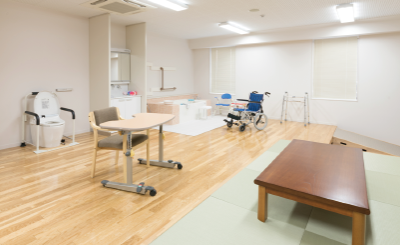
Home Health Nursing Practice Room
The University is equipped with practical training rooms where students can learn practical nursing skills in each area. The "Basic Nursing Practicum Room," where students learn the basic skills of professional nursing assistance through the latest learning system. The "Home Health Care Nursing Practicum Room," where students learn the meaning of home health care and learn the basics of home health care nursing assistance with a focus on daily life, and more.
3.Acquire the skills to play an active role in a global society
Overseas Training
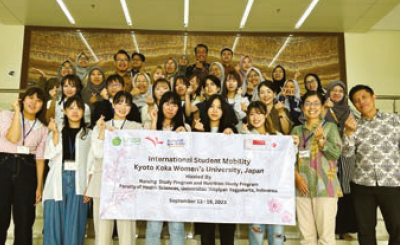
Cultural exchange with Indonesian students
With the advancement of globalization, there are more and more opportunities to care for people of different cultures, both domestically and internationally. In addition to acquiring nursing knowledge and skills, students acquire a global perspective through international exchange with students from other countries who share the same goals through overseas nursing training and short-term study abroad programs and pursue nursing care that respects diversity.
*Overseas training is not mandatory.
4.Cultivate the ability to respond appropriately in the field
Team medicine and comprehensive community care
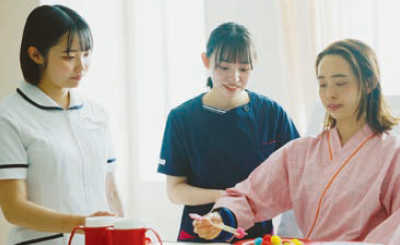
Taking advantage of the breadth of medical and welfare professional training, which is top-class in the Kyoto-Shiga area, we are developing a multi-professional cooperative education in which students learn together with students from other departments such as rehabilitation, nutrition, dentistry, and psychology. Through exposure to diverse values, students gain a universal perspective and develop the ability to collaborate with other professions and interdisciplinary nursing skills.
▶︎SUBJECT PICK UP!
Learn to take care of your own health
Holistic Health I
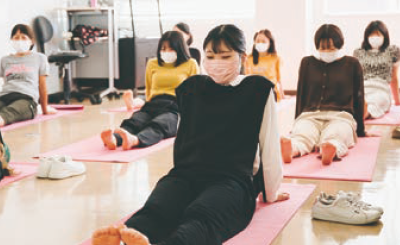
Students will learn complementary and alternative therapies, yoga, and aromatherapy to enhance the natural healing power of the human body, and will gain a comprehensive understanding of the health of humans in general, not only in physical and mental terms but also in terms of the environments surrounding the person.

▶︎Home Page
Department of Health and Nutrition – National Registered Dietitian Training Course
Become a Registered Dietitian who Supports Health through Food by Working on an Individual Basis
The "Medical Nutrition Course" trains dietitians to manage nutrition in medical and welfare facilities. The "Food Creation Course" trains dietitians to work for food manufacturers, food processing companies, and food service and home meal service companies. Both courses aim to train dietitians who can support health through food by working on an individual basis.
▶︎Achieve Your Dreams through In-depth Studies
Medical Nutrition Course
This course trains dietitians for nutrition management in hospitals and welfare facilities with the ability to contribute as a member of a medical team through multidisciplinary education. Students learn the physiology required for ward nutrition management, planning of nutritional supplements suited for each ailment, frailty* prevention, and tailor-made nutritional therapy.
*Frailty is said to be the stage between normal health and the stage of needing nursing care, and refers to the overall decline that tends to occur with advancing age, including the decline of muscle strength with age, fatigue, and the tendency to stay indoors.
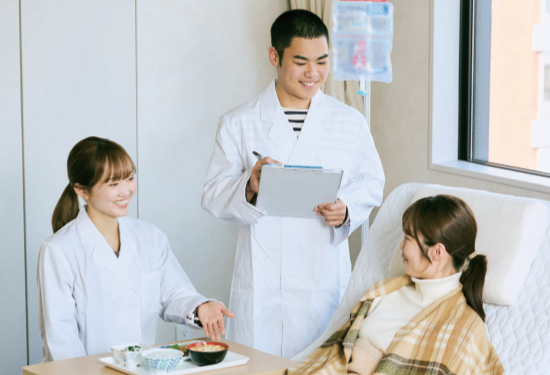
Food Creation Course
This course is designed to train dietitians who will be active in food manufacturers, food processing, and the food service and home meal industry. Students acquire the knowledge and skills to propose healthy menus and develop functional foods that address health issues. As well as basic knowledge and processes in food development, and principles of manufacturing processed foods. Allowing students to create foods and menus to then communicate to society.

▶︎SUBJECT PICK UP!
Medical Nutrition Course
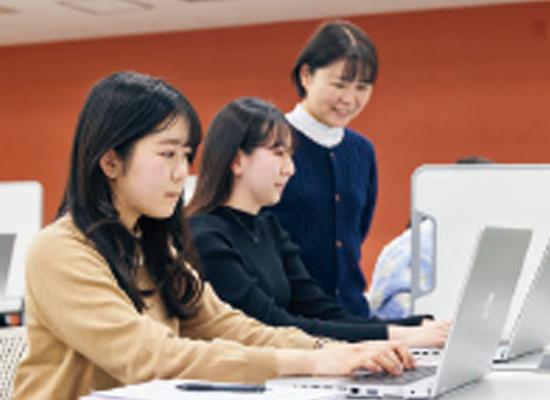
Gain Practical Skills – Public Nutrition Practicum
Students learn about dietary survey methods and statistical processing necessary in public nutrition activities, as well as the planning and implementation of public nutrition programs. Students acquire practical skills in the cycle of formulating and implementing activity goals and plans based on needs and issues of target areas and populations, and evaluating the results.
Food Creation Course
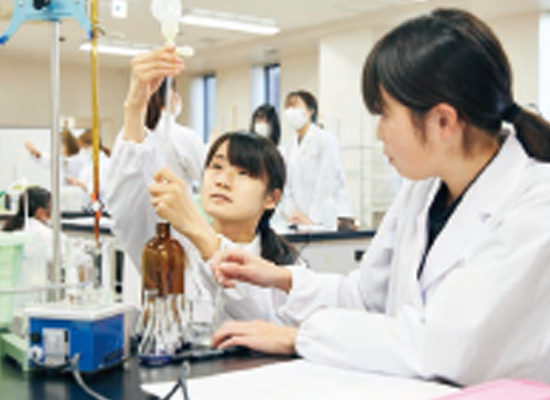
Gain a Deep Understanding of Food Components through Experiments – Food Science Experiment II
As the next step to obtaining knowledge through lectures on food science and other subjects, students, through experiments, study food components (inorganic substances, vitamins, and taste components), physical and other properties. Students learn the chemical properties of ingredients in everyday foods, and acquire techniques (planning, reliability, and safety) for food analysis.
Observing and experiencing the handiwork of artisans – Kyoto's Food Culture Learning Kyoto's food culture through a menu development project with JA Zen-Noh Kyoto
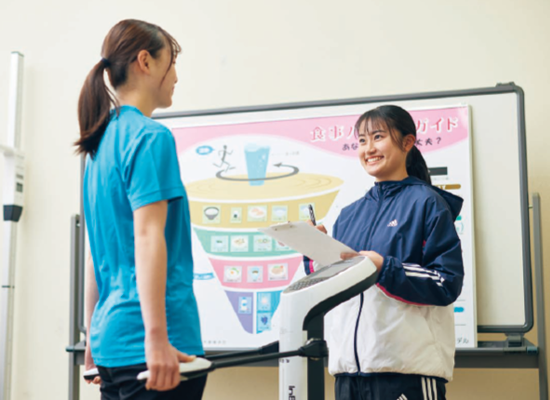
▶︎Home Page
Department of Health and Nutrition – Health, Sports and Nutrition Course
Managing Health from Both Sports and Nutrition Education
The Course aims to nurture human resources who can manage people's health from the perspectives of both sports and nutrition education. In the "Sports Management Course," students learn about appropriate menus and nutritional supplements that provide nutrients according to health conditions and lifestyles. In the "Food Management Course," students learn about menu development, from production to sales and public relations activities, and other areas that transcend the boundaries of conventional dietitian training.
▶︎Acquire a Wide Range of Knowledge and Skills in the Study of Sports & Nutrition
Sports Management Course
Students will learn how to provide appropriate diet and nutritional supplementation for a wide range of subjects, from the general public to athletes, according to each health condition and lifestyle. In addition, there are many exercises and practical training sessions to consolidate knowledge and acquire practical skills. As well as learning how to exercise in a practical way that is effective for maintaining good health.
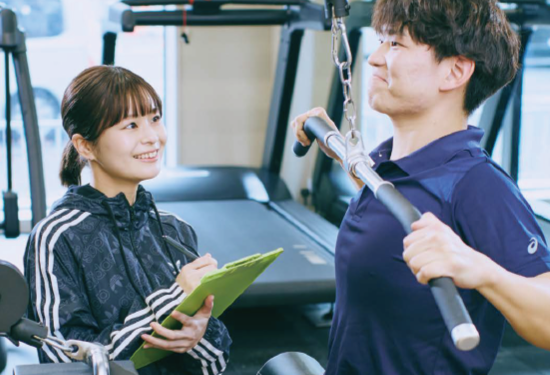
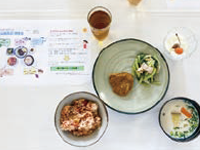
Food Management Course
To be active in the food business field, the course goes beyond the boundaries of conventional dietitian training. From production to sales and PR activities related to menu development, covering all aspects of "Food". Through overseas training and other programs, students will be exposed to different cultures and values, training nutritionists who can develop a diverse range of food products.
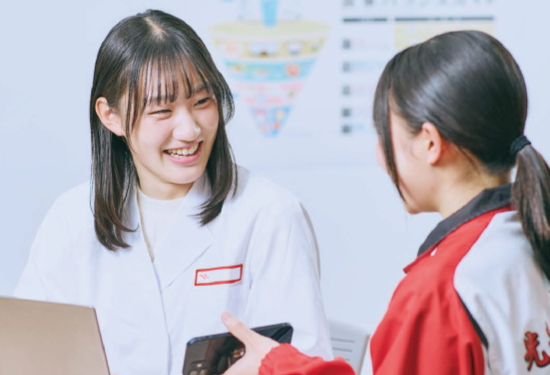

▶︎SUBJECT PICK UP!
Food Management Course
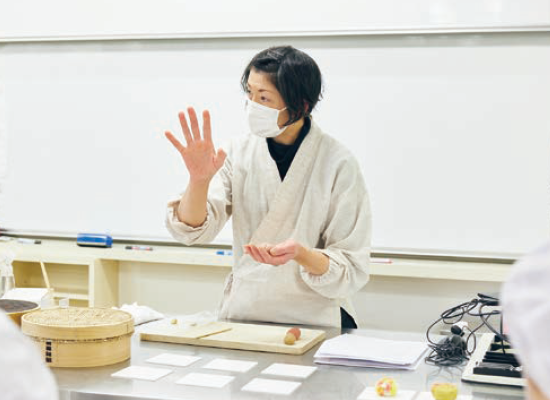
Students learn about the history and characteristics of Kyoto confectionery in classroom lectures. After which, they will observe the handiwork of Kyoto confectionery artisans up close, and actually experience confectionery making during practical training. Through such hands-on learning, students will be exposed to Kyoto's deep culinary arts and acquire a sensitivity to enjoy food using all of their five senses.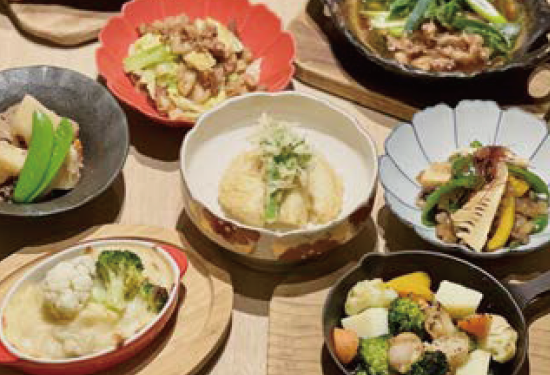
~Industry-University Collaboration Project~
In cooperation with “Minoru Dining” operated by JA Zen-Noh Kyoto, we are working to develop menus using seasonal ingredients from Kyoto.
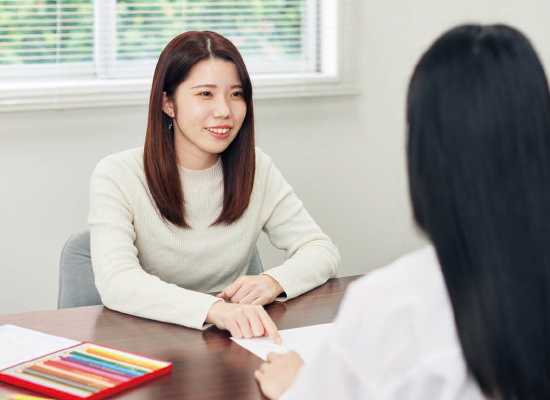
▶︎Home Page
Department of Psychology
Studying the mind shows me new possibilities
Students will acquire practical skills in the three courses of "Clinical and Psychological Counseling," "Child and Development Support," and "Social and Criminal Psychology". To apply them in various fields such as medicine, education, welfare, childcare, judiciary, and industry.
▶︎The Three Courses to Deepen Your Learning

Clinical and Psychological Counseling Course
To be close to those in need of psychological support, students learn the fundamental knowledge and skills of professional support such as psychological assessment and psychological interviewing. For those who wish to become a licensed psychologist or a clinical psychologist, we provide support for their further education.
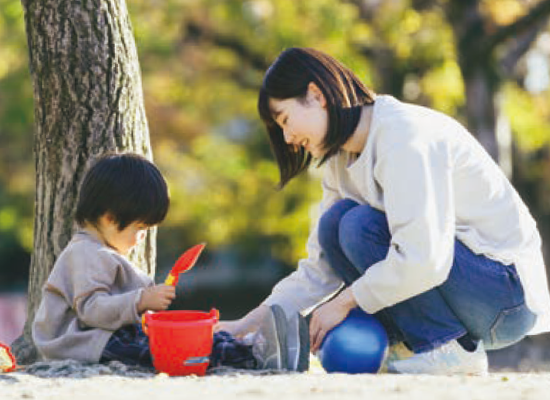
Child and Development Support Course
To support development and respond to needs of infants and children, students learn the fundamental knowledge and skills of developmental psychology and developmental support. We also train childcare workers and child guidance staff who work in child welfare facilities.
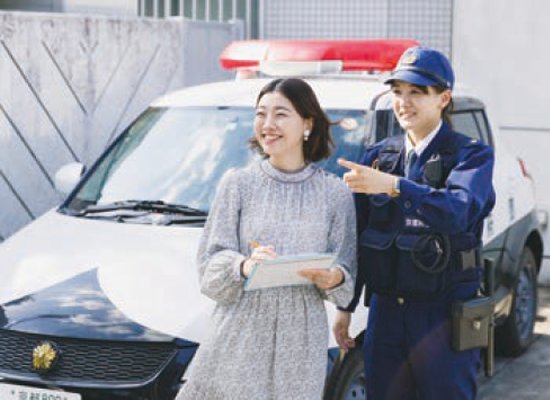
Social and Criminal Psychology Course
Students learn social psychology, which explores the psychological interactions between people and between people and society, such as the psychology of interpersonal relationships and consumer behavior. As well as criminal psychology, which explores the psychology of offenders, crime prevention, and psychological care for juvenile delinquents.
▶︎SUBJECT PICK UP!
Examining the relationship between culture and healing through experience Kyoto Cultural Psychology
Students will examine the components of "Kyoto-ness" from a psychological viewpoint. Through fieldwork such as making Kyoto sweets, students will experience and deepen their understanding of what makes Kyoto unique. Also, through the experience of making incense bags and devising a plan for a Journey of Kyoto, students will consider the relationship between Kyoto culture and healing. This class incorporates a wealth of off-campus experiential learning opportunities that allow students to understand Kyoto culture through independent experiences and to realize that they are living in the midst of the culture.
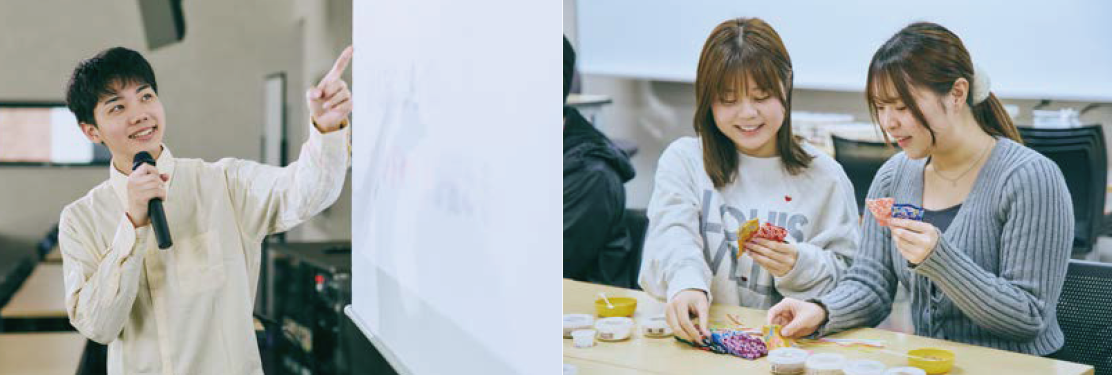
Scheduled to open in April 2026 (tentative name, under planning for installation) <More than 40 different qualifications> Creating a new society by connecting people, communities, and the world <Three courses to enhance your expertise> Regional Co-creation Course ▶︎Recommended for people who… Cultural Co-creation Course ▶︎Recommended for people who… Smart Society Co-Creation Course ▶︎Recommended for people who… <Features of learning not found in other sociology departments>
The above plans are tentative and are subject to change.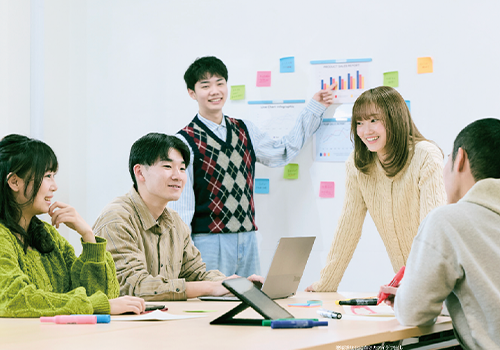
Faculty of Sociology – Department of Social Co-creation
An entirely unique department of sociology!
Our department does not only work on solving social problems. Under the slogan of “Co-creation,” we aim to create a society of “Well-Being” in which everyone can live with a smile by combining diverse ideas and strengths. Students will learn with an emphasis on practical application of “design mindset,” which leads to the discovery and solution of problems.
It is also possible to take lessons across courses.
Change the future from the community
With your ideas let the city and its people shine!

Love their hometown and want to energize their community
Are interested in community development
Enjoys working directly with people
Creating the Future through Culture
Let's create a culture from Kyoto that will inspire Japan and the whole world!
Like traditional culture, art, music and entertainment
Want to promote Japanese culture globally
Want to create something new with creative ideas
Pioneering the Future with a Digital x Management Perspective
Become a creator who makes smart changes in society
Value both digital technology and humanities-oriented learning
Want to use programming and data analysis to solve social problems
Enjoy using new services and applications
1. New Faculty of Sociology that capitalizes on Kyoto Koka's strengths
We offer a fusion of arts and sciences based on sociology that crosses multiple fields such as management, psychology, data science, and IT. Through practice-oriented learning, students will acquire “problem discovery” enhanced by “design mindset that leads to solutions.”
2. Co-creation with companies and communities – Enhancement of social implementation projects
Students will “co-create” with local governments, companies, and NPOs in Kyoto and other regions, and work on local issues in a practical manner. We will promote educational activities that involve the planning of new services, events, and products and their implementation in society.
3. Gaining an “Overwhelming Understanding of Japanese Culture” along with a “Global Perspective”
Utilizing the university's extensive network, students will learn about the history of Japanese culture and its universal values that transcend time and region. In addition, through exchange programs with overseas universities and international organizations, students can learn about global issues and international examples of social co-creation.
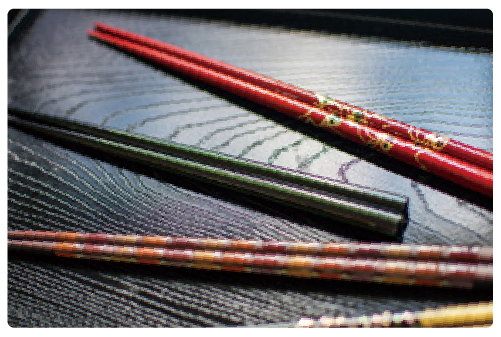
4. Small class sizes and thorough practice-based exercises
We offer a small-group program to acquire the skills necessary for social co-creation such as communication and presentation. The program provides a learning environment where students can study close to faculty members in a wide range of specialized fields, and can also take on the challenge of entrepreneurship.
<Practical Skills Development Courses>
Wellness
Programming
Information and Communication
Social Research/Data Application
Design
Career Development/Entrepreneurship
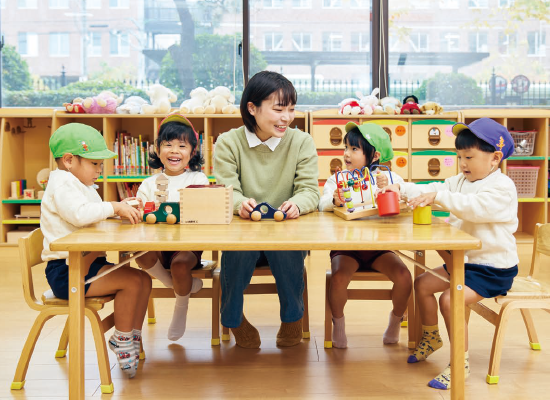
▶︎Home Page
Department of Child Education – Early Childhood Education Program
Become a childcare provider who can tend to individual needs of a child and improve themselves
Students can acquire three qualifications and licenses for preschool, kindergarten, and elementary school at the same time. Koka nurtures students with practical skills through abundant on-the-job experience at the Koka Kindergarten and elementary school, which are located next to the university, in order to develop human resources who nurture rich sensibilities.
▶︎Learning Points
● A wealth of classes and initiatives to interact with children
● Simultaneous acquisition of qualifications and licenses for preschool, kindergarten, and elementary school is possible.
● Cultivate piano skills through fulfilling small class lectures
▶︎PICK UP! Subjects
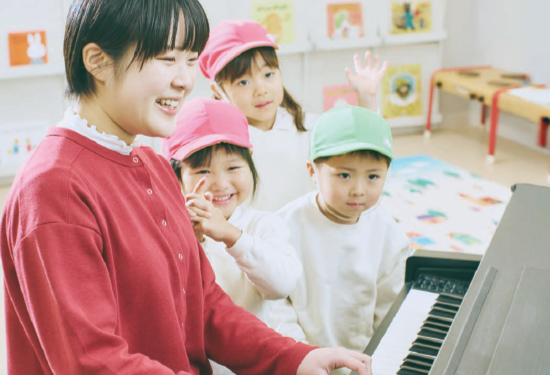
In order to put the expressive activities learned in class into practice in an actual childcare situation, students will perform in groups an expressive play based on picture books for the children of Koka Kindergarten, which is attached to the school. The groups will prepare for the event by exchanging opinions on how to make the activities enjoyable for the children, from the introduction to the individual actions.
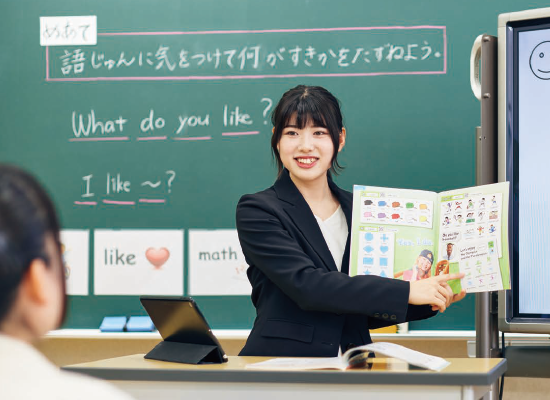
▶︎Home Page
Department of Child Education – Primary Education Course
Become an educator who can tend to children and never stops self improving
In addition to a first-class elementary school teacher's license, students will aim to obtain a first-class kindergarten teacher's license. Students will develop teaching skills that are needed for the future of education, such as foreign language subjects and ICT utilization.
▶︎Learning Points
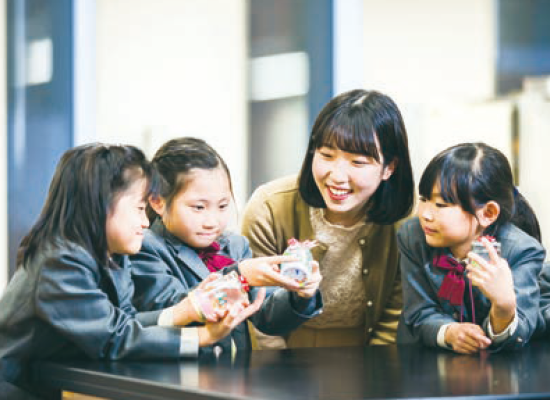
● On-site experience at Koka Elementary School, located right next to the campus
● Acquire ICT instructional skills that can be applied in the classroom of the future
▶︎TOPICS
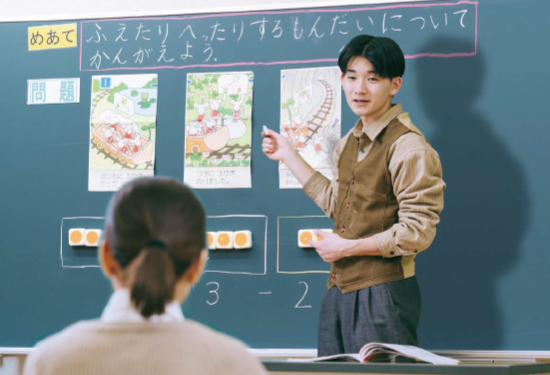
Koka Children's Club, a place of practice that fosters student independence
"Koka Children's Club" invites after school students from Koka Elementary School to the university's classrooms. Students proactively devise the content of the activities so that the participating elementary school students can acquire empathy, independence, creativity, and problem-solving skills.
Advanced Course in Dental Hygiene Opening in 2027! (Under development)
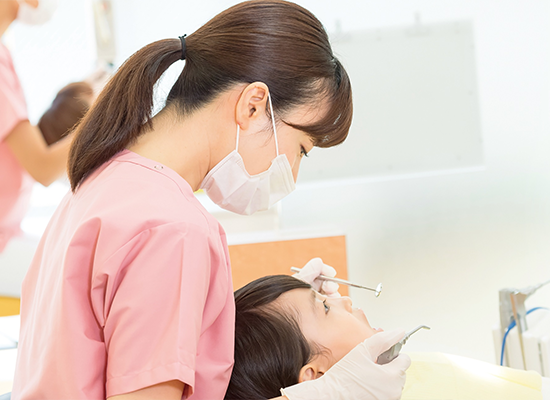
▶︎Click here for the homepage
Department of Dental Hygiene (Three-year program)
Training dental hygienists to meet the dental and oral health needs of all life stages.
Based on the school’s founding spirit, we nurture considerate and compassionate dental hygienists who can solve the dental and oral health issues of people of all ages, and help local residents improve their health. We equip our students with the education and attitude to care about the health of each and every individual.
▶︎After passing the national examination, you can obtain a medical visa and work in Japan!
1.Instruction by experts in the field
Dentists are enrolled as full-time faculty members
Students can learn under a highly experienced team of professionals with expertise in a wide range of areas such as the neural mechanisms of chewing and swallowing, bacteria that cause caries and periodontal disease, maintenance after implant treatment, dental care of children, dental care of hospitalized and bedridden patients.
Three Major Duties of a Dental Hygienist

Dental prophylactic treatment: Preventing "tooth decay" and "periodontal disease"
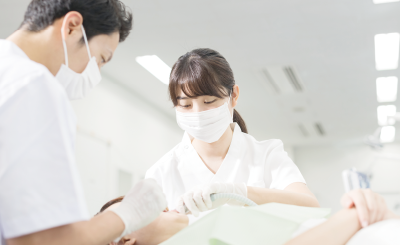
Dental treatment assistance: Provide support to dentists
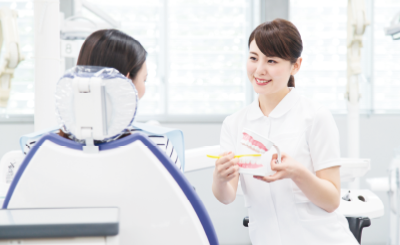
Dental health guidance: Support to maintain oral health
2.Enhance practical skills through ample practical training
Dental health guidance at affiliated elementary schools and kindergartens
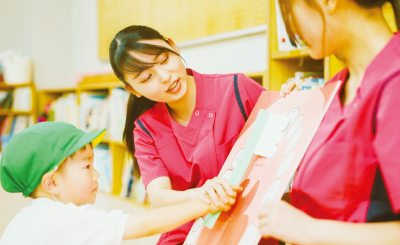
We have an elementary school and a kindergarten within the premises. The strength of our college is that we frequently provide dental health guidance to children and kindergartners, to improve the students' practical skills by gaining a lot of on-site experience, which can be difficult at other training schools.
3.Aiming to be a dental hygienist needed in the modern age
Multi-professional education utilizing a wide range of professional training systems
In recent years, dental hygienists have been required to provide oral health care for patients not only in dental clinics but also in hospitals, nursing care facilities, and patient's homes, as well as working in collaboration with multiple professions, which comes with the demand for more advanced and diverse knowledge and skills. That is why we provide multidisciplinary education utilizing the breadth of our top-level professional training in the fields of health, medicine, and welfare in collaboration with Kyoto Koka University.
4.Acquire a rich culture and excellent communication skills
Students can take a wide variety of courses at the affiliated university
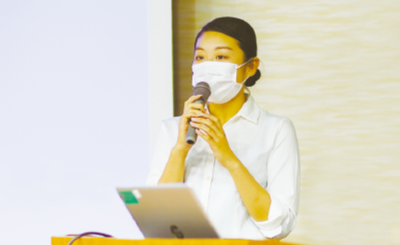
Specialized knowledge and skills alone are not enough to provide appropriate oral health care for a diverse range of patients. We offer many classes that foster independence by incorporating active learning and a wide variety of subjects to develop communication skills. Students can also deepen their education by taking a wide range of courses at Kyoto Koka University, which is also located on-site.
An “Advanced Course in Dental Hygiene” is being planned to be established for one more year of study after graduation from the junior college. Recommended for those who want to learn professionally and advance their careers.
Possibility of obtaining a four-year university qualification (bachelor's degree)
A bachelor's degree (Oral Health Sciences) is available by continuing on to the Advanced Course in Dental Hygiene. It can greatly broaden your future career path, including employment in companies, large hospitals, educational and research institutions, and graduate school.
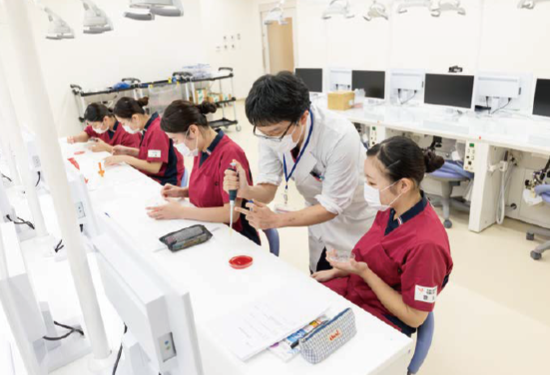
Learning to cultivate the skills necessary to open up the future Presentation skills
The power to take on new challenges in the world: Entrepreneurship etc.
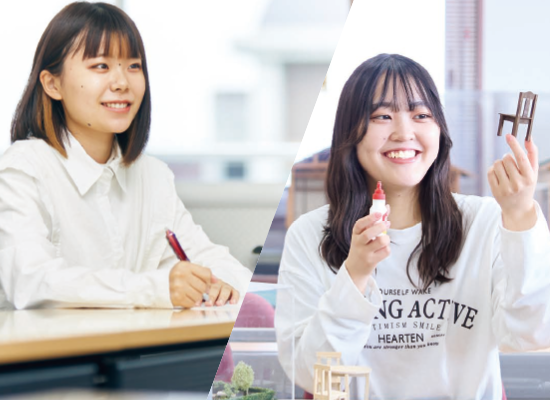
▶︎Click here for the homepage
Department of Contemporary Life Design (Two-year program)
Contribute to the local community and society by carving out their own future
Students will acquire basic knowledge, and problem finding abilities, and develop the ability to carve out their own future, through a wide range of studies tailored to the students' interests and dreams, as well as through experience in cooperative activities with companies and local communities,
▶︎Learning Points
There is no limit to the areas of interest you can choose!
33 types of qualifications you can aim for
●LDC (Life Design Competency)
LDC is the ability to open up the future, which cannot be measured by written tests. Skills such as communication skills and cooperativeness with others in order to carry out projects, and proactivity to achieve goals.
Communication skills
Problem finding and solving skills
Information gathering and analysis
Self-analysis and self-affirmation
●Cultivating the two skills to become human resources who can carve out their own future
The power to discover one's own potential: life design
LDC Students will acquire communication and cooperative skills that will enable them to work with others on projects.
Liberal Arts Students will hone their ability to know themselves, interact with society, look to the future, and design a happy life that is uniquely their own.
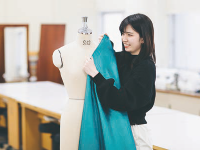
Fashion
Start with the basics of the fashion business and the fundamentals of making clothes. Analyze fashion from various perspectives and acquire knowledge that will be useful in the fashion industry.

Bridal
Acquire basic knowledge of the bridal business and practical skills necessary for bridal coordination, aiming to develop skills to play an active role in the bridal industry.
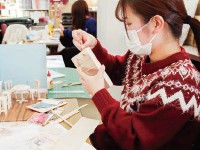
Interior Design
Acquire multifaceted knowledge of housing and interior design. As well as the ability to imagine and shape spaces through a well-developed curriculum.
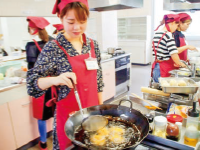
Food
Acquire knowledge about food, cooking, and the food business, and hone the ability to create a rich dietary life.
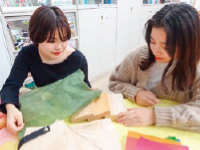
Design and Planning
Acquire the ability to design objects through practical classes utilizing graphic techniques and practicing the process of developing new ideas.
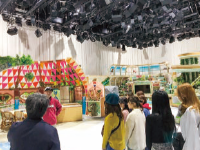
Entertainment
Acquire knowledge about strategies for entertaining people. Themes include male idols, anime movies, TV programs, comedy, and more. As well as acquiring effective communication skills.
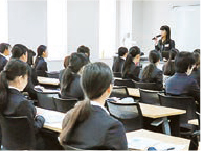
Business Design
Students acquire the practical skills and manners necessary to be an active member of society.
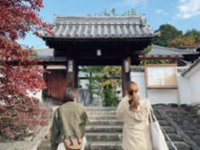
Tourism
Acquire knowledge about the tourism industry and hotel business, and hone the skills necessary to work in the tourism field in the international tourism city of Kyoto.
See here for further information for each department or graduate school
*The Graduate Schools and the Advanced Courses do not offer the International Students Entrance Examination.
Foreign Students Admissions Outline
For details on the application procedure, please click here.
Tuition Fee
Successful applicants of the international student admission:Exemption from 50% of admission fee as well as 25% of tuition fee.
Applicable to those with a Examination for Japanese University Admission for International Students (EJU) score of 280 or above in the Japanese category (must include the Writing test). Or otherwise pass N1 level on the Japanese Language Proficiency Test (JLPT).:Exemption from 40% of annual tuition fee
for the first year.
*In the case of 25% tuition fee reduction (Scheduled for FY 2026)
(Subject to revision depending on circumstances)
Occupational Therapy Major/Speech-language Hearing Therapy Major
Admission Fee (50% exemption):¥125,000
Annual Tuition Fee (25% exemption):¥915,000
Experiment Training Fee (annual fee):¥180,000
Student Union Fee (annual fee, membership fee is included):¥5,700
Scholarship Fee (annual fee, membership fee is included):¥13,400
Total Initial Annual Student Contribution:¥1,239,100
Total Initial Annual Student Contribution from Second Year:¥1,296,400
Department of Nursing
Admission Fee (50% exemption):¥125,000Annual Tuition Fee (25% exemption):¥945,000
Experiment Training Fee (annual fee):¥250,000
Student Union Fee (annual fee, membership fee is included):¥5,700
Scholarship Fee (annual fee, membership fee is included):¥13,400
Total Initial Annual Student Contribution:¥1,339,100
Total Initial Annual Student Contribution from Second Year:¥1,396,400
National Registered Dietitian Training Course
Admission Fee (50% exemption):¥125,000Annual Tuition Fee (25% exemption):¥825,000
Experimental Training Fee (annual):¥50,000
Student Union Fee (annual fee, membership fee is included):¥5,700
Scholarship Fee (annual fee, membership fee is included):¥13,400
Total Initial Annual Student Contribution:¥1,019,100
Total Initial Annual Student Contribution from Second Year:¥1,076,400
Health, Sports and Nutrition Course
Admission Fee (50% exemption):¥125,000Annual Tuition Fee (25% exemption):¥795,000
Experimental Training Fee (annual):¥20,000
Student Union Fee (annual fee, membership fee is included):¥5,700
Scholarship Fee (annual fee, membership fee is included):¥13,400
Total Initial Annual Student Contribution:¥959,100
Total Initial Annual Student Contribution from Second Year:¥1,016,400
Department of Psychology/Department of Social Co-creation
Admission Fee (50% exemption):¥125,000
Annual Tuition Fee (25% exemption):¥727,500
Experiment Training Fee (annual fee):¥0
Student Union Fee (annual fee, membership fee is included):¥5,700
Scholarship Fee (annual fee, membership fee is included):¥13,400
Total Initial Annual Student Contribution:¥871,600
Total Initial Annual Student Contribution from Second Year:¥928,900
Department of Child Education
Admission Fee (50% exemption):¥125,000Annual Tuition Fee (25% exemption):¥735,000
Experimental Training Fee (annual):¥0
Student Union Fee (annual fee, membership fee is included):¥5,700
Scholarship Fee (annual fee, membership fee is included):¥13,400
Total Initial Annual Student Contribution:¥879,100
Total Initial Annual Student Contribution from Second Year:¥936,400
Kyoto Koka College Department of Dental Hygiene(Three-year program)
Admission Fee (50% exemption):¥115,000Annual Tuition Fee (25% exemption):¥697,500
Experiment Training Fee (annual fee):¥100,000
Student Union Fee (annual fee, membership fee is included):¥5,700
Scholarship Fee (annual fee, membership fee is included):¥13,400
Total Initial Annual Student Contribution:¥931,600
Total Initial Annual Student Contribution from Second Year:¥983,900
Kyoto Koka College Department of Contemporary Life Design(Two-year program)
Admission Fee (50% exemption):¥115,000Annual Tuition Fee (25% exemption):¥742,500
Experimental Training Fee (annual):¥0
Student Union Fee (annual fee, membership fee is included):¥5,700
Scholarship Fee (annual fee, membership fee is included):¥13,400
Total Initial Annual Student Contribution:¥876,600
Total Initial Annual Student Contribution from Second Year:¥943,900
Entrance Examination Fee
¥15,000
Scholarships
Koka offers the following scholarships to international students.
| Name of Scholarship | Scholarship for International Students with Superior Academic Achievements |
| Description | Awarded to international students with particularly outstanding character and academic performance in each academic year (those who have cleared the standard number of credits and have a high GPA). |
| Amount | 1st to 3rd rank: 400,000 yen, 4th rank and below: 200,000 yen (per year) |
| Eligibility | Within 30% of international students in each academic year |
In addition, we actively recommend and support students to apply for outside scholarships.
International Students Entrance Examination Outline
For details on application procedures, please click here.
Entrance Examination Schedule for International Students (Domestic and Overseas) and Japanese Language Criteria
| Admissions for international students | Application period | Examination date | Announcement of Acceptance or Rejection | |
|---|---|---|---|---|
| Japanese domestic examination *Japanese essay and interview |
1st period | Monday, September 22, 2025 - Friday, October 3, 2025 | Sunday, October 19 | Saturday, November 1 |
| 2nd period | Monday, November 17, 2025 - Friday, November 28, 2025 | Sunday, December 14 | Tuesday, December 23 | |
| 3rd period | Monday, December 22, 2025 - Friday, January 9, 2026 | Sunday, January 25 | Wednesday, February 4 | |
| 4th period | Monday, February 9, 2026 - Friday, February 20, 2026 | Monday, March 9 | Monday, March 16 | |
| Examination outside Japan *Online interview |
1st period | Monday, September 8, 2025 - Friday, September 19, 2025 | Saturday, October 4 | Wednesday, October 15 |
| 2nd period | Monday, November 17, 2025 - Friday, November 28, 2025 | Saturday, December 13 | Tuesday, December 23 |
*Department of Nursing, Health and Nutrition and Registered Dietitian Major, and Department of Dental Hygiene entrance exams can only be taken within Japan.
*Regarding Japanese Language ability for admission, the Faculty of Nursing, Welfare and Rehabilitation and the College Department of Dental Hygiene require JLPT N1 level, while other departments and majors require N2 level (EJU, JPT, J.TEST, and NAT-TEST are also acceptable).
Student Dormitory – Shinshin Ryo Dormitory
Supporting you and your safety as you start living away from home
This is a student dormitory attached to the campus.
Healthy breakfasts and dinners are provided.
*Please note that there may be cases when rooms are full.
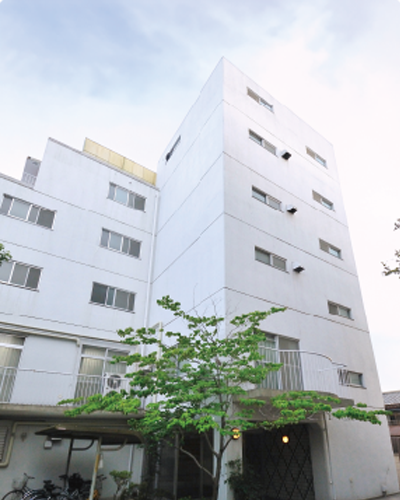
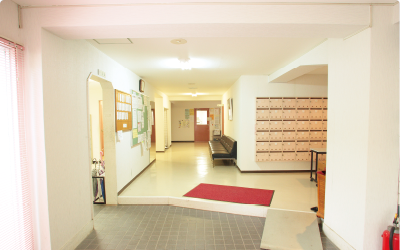
Entrance
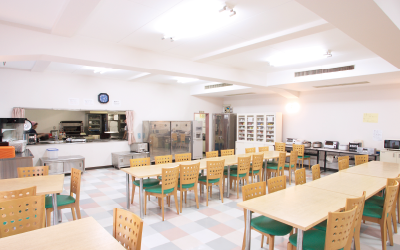
Cafeteria
For students enrolling in the 2025 academic year
Shinshin Ryo Dormitory expenses, etc.
A Single Room
| First semester | Second semester | Annual total | |
|---|---|---|---|
| Entrance fee (first year) | 70,000 yen | – | 70,000 yen |
| Dormitory fee (including meals and light, heating and water utilities) | 450,000 yen | 450,000 yen | 900,000 yen |
Students’ Voices
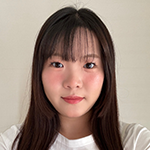
Name
WANG Born in China
Department Name
Department of Health and Nutrition, National Registered Dietitian Training Course
Why did you choose Koka?
I chose Kyoto Koka because Kyoto is my favorite city. I came to Kyoto on a trip and liked the city's rich nature and its historical and stylish atmosphere. Another major reason I chose the university was that it offers a lot of support for international students.
How is your campus life?
After I entered, I found that studying food management was more difficult than I expected. But the teachers are kind. Also, in the “Japanese Language Community” twice a week, my Japanese seniors teach me if I don't understand my assignments, which is a lot of help.
Do you have any message for younger students?
I am a member of the university's volleyball club. I enjoy student life with my Japanese friends. Please come to Kyoto Koka!
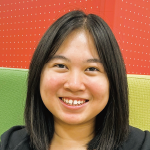
Name
TERESA Born in Indonesia
Department Name
Department of Psychology
Why did you choose Koka?
I chose this university because it is the closest to home, has a wealth of traditional cultural education, clubs, and volunteer activities. Also, Koka offers a lot of support for international students.
How is your campus life?
Kyoto Koka has a wealth of support for international students (Japanese classes, giving us information through LINE, etc.), and I feel connected with everyone and that a community has been properly established. We are both very much enjoying ourselves. We have joined the Kyudo (Japanese archery) club, volunteer clubs, and other clubs related to traditional Japanese beauty.
Do you have any message for younger students?
It is important to be active throughout your campus life, such as making friends and not hesitating to ask questions if you do not understand something in class. It is also a good idea to make Japanese friends in clubs and other activity groups.
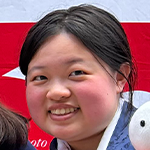
Name
MA Born in China
Department Name
Department of Psychology
Why did you choose Koka?
It was because Koka had a Psychology Department that I had always wanted to study and was recommended by a teacher at my Japanese language school.
How is your campus life?
Making friends with Japanese students and other international students and studying together really makes me feel that I am in Japan. At the same time, I feel motivated to learn more. I also appreciate that Japanese seniors help me with issues at the “Japanese Language Community,” a study support program for international students.
Do you have any message for younger students?
College courses can be difficult and require listening comprehension, thinking skills, and self-discipline, so I wish you all the best.

Name
DULEEKA Born in Sri Lanka
Department Name
Department of Contemporary Life Design
Why did you choose Koka?
My Japanese language school teacher introduced me to Kyoto Koka and its students, and I thought Koka was a good fit for what I wanted to study. My dream is to open a restaurant in Japan, so I was glad that at Koka I could study life in Kyoto, IT, business, as well as cooking.
How is your campus life?
It is difficult to study the same thing as native Japanese students, but my Japanese level has improved, and I have made many friends. My knowledge has also increased considerably. In addition, Japanese peer supporters help me with my assignments and teach me in the “Japanese Language Community,” which is a support program for international students, and they are very helpful.
Do you have any message for younger students?
There are many types of events. I enjoy volunteering at a Kodomo Shokudo cafeteria helping children. Please come to Kyoto Koka.
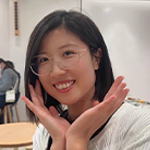
Name
CHEN Born in China
Department Name
Department of Health and Nutrition, National Registered Dietitian Training Course
Why did you choose Koka?
I attended the open campus after being introduced by a teacher at a Japanese language school. I chose this university because I thought it had a great atmosphere, the teachers were kind, and that it was a wonderful university.
How is your campus life?
Twice a week, there is a “Japanese Language Community” for international students' study support, where teachers and Japanese seniors help us with things like class assignments. Also, all classes are taught in detail from the basics, which I think is really good. Studying nutrition is difficult, but it is fun to cooperate with everyone in the cooking class to make dishes, and I can learn a lot of new knowledge. I also joined the volleyball club and enjoy student life with my Japanese student friends.
Do you have any message for younger students?
Please study Japanese diligently, decide on a field you like, and work toward your own goals.
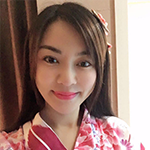
Name
MENG Born in China
Department Name
Department of Psychology
Why did you choose Koka?
A teacher at my Japanese language school introduced me to Koka. I came to the open campus and thought the atmosphere and Buddhist-based campus culture was nice. The teachers at Koka are kind, and I felt reassured by the study support for international students.
How is your campus life?
After entering the school, I visited a temple because of a school event and was very moved by it. Of the specialized classes I find that “Introduction to Psychology” is very interesting and the class atmosphere is very nice. Twice a week, there is a “Japanese Language Community” for international students, where Japanese seniors help us with class assignments and other things. I have made lots of Japanese friends. I am also involved in the yoga club, international exchange club, and the kimono dressing club. My schedule is packed but my campus life is very enjoyable.
Do you have any message for younger students?
It is very fun at Kyoto Koka University. There are no worries for both your studies and university life.
Graduates’ Voices
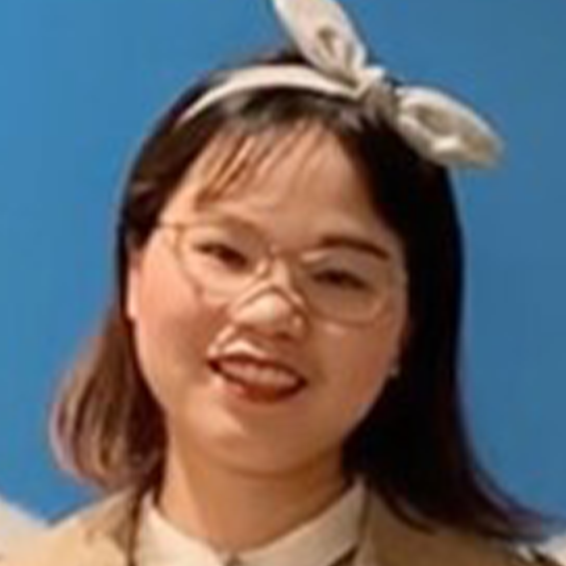
Name
ZHANG Born in China
Department Name
Graduate School of Nursing Science
Career path after graduation Place of Employment (Company Name)
Osaka LINK Care Service
Why did you choose Koka?
Kyoto Koka University allows me to take graduate school classes while continuing to work. And as a believer in Buddhism since childhood, Koka being a Buddhist school is another attraction of Koka. Many scholarships are available to help international students.
What was the best thing about Koka?
The best thing about studying at Kyoto Koka University is that I can attend school while working, which gives me the opportunity to continue to be exposed to education and deepen my knowledge while still working as a member of society. I hope to use all the knowledge and intuitions I gained in class in my future professional life.
How is the support by our staff?
I think the support by the teachers staff at Kyoto Koka University is good. They always take the time to explain things patiently and are always generous. They have been a great help.
What is the best thing about studying in Kyoto?
Kyoto is a modern city with a very strong historical background, a millennial capital with many temples, green mountains, and rich rivers. I think Kyoto has a unique charm that no other city in Japan can match.
What did you do about employment and career paths?
I am currently working as a nurse at a paid senior citizen center in Osaka, and I am quite satisfied with my job. At first, I was worried but now that I am used to things I am finding great motivation and growth in myself. And I hope to continue doing what I love in the future.
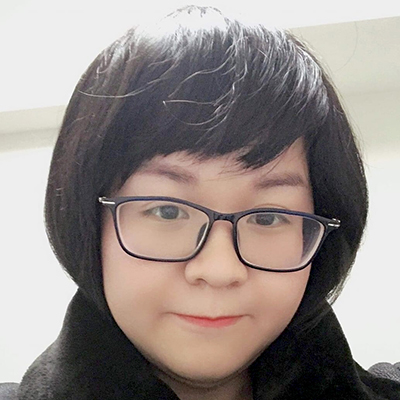
Name
PHAN Born in Vietnam
Department Name
Department of Career Development
Why did you choose Koka?
I decided to apply because when I attended the open campus, I got a good feeling from the school. Now after enrolling in the school, I think I made the right choice.
(Vietnamese)
Khi đến tham quan trường đại học thì thấy ấn tượng tốt nên đã tham gia vào kì thi tại nhà trường. Rất tốt vì đã đỗ.
What was the best thing about Koka?
I am particularly interested in the classes on Tourism and Bridal. The Project classes are always very fun and interesting as well.
(Vietnamese)
Tôi đặc biệt thích các lớp học về du lịch và đám cưới. Ngoài ra, các lớp học dự án luôn rất vui vẻ và thú vị. Tôi luôn nhận được lời khuyên, sự quan tâm và nhiều thứ khác từ cố vấn của mình. Tôi thực sự biết ơn.
How is the support by our staff?
Teachers are always caring and eager to teach. The staff members are caring towards the students, and if we have any problems or questions, they will be happy to help us.
(Vietnamese)
Các giáo viên và nhân viên tại Đại học Nữ sinh Kyoto Koka luôn nhiệt tình hỗ trợ và quan tâm đến học sinh của mình. Bất cứ khi nào tôi gặp vấn đề hoặc muốn hỏi điều gì đó, tôi đều được giải thích rất kỹ.
What did you do about employment and career paths?
"I have found a job in Japan. This job is in Tsukuba City, Ibaraki Prefecture, and I am in charge of trainee management."
(Vietnamese)
Tôi đã quyết định làm việc ở Nhật Bản. Công việc của tôi là quản lý thực tập sinh tại thành phố Tsukuba, tỉnh Ibaraki.
Do you have any message for people preparing for the entrance exam?
I wish you all the best in your entrance examinations, and Kyoto Koka University is waiting for you. For me, Kyoto Koka University was the best choice and I am so grateful for them.
(Vietnamese)
Tất cả các thí sinh trong kỳ thi tuyển sinh hãy cố lên , Đại học Nữ sinh Kyoto Koka đang chờ đợi bạn. Đối với tôi, tôi tràn ngập lòng biết ơn và nói, `Tôi rất vui vì đã chọn Đại học
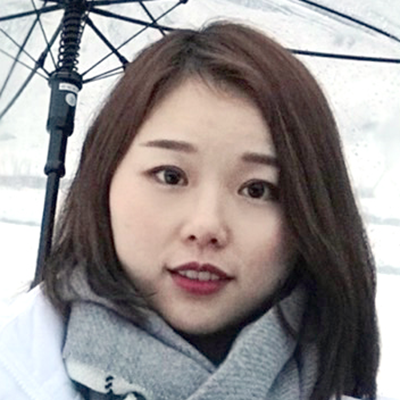
Name
HE Born in China
Department Name
Graduate School of Nursing Science
Career path after graduation
RANOK Corporation (Nurse))
Why did you choose Koka?
Before attending graduate school, I worked as a nurse in a clinical setting for five years, but I came to realize that I did not have enough knowledge. So, a senior colleague introduced me to Koka, where I could study nursing further. Many students in the Graduate School of Nursing Science study while working in the nursing profession, and I was able to broaden my knowledge through specialized courses and general education courses. I was also able to research and analyze questions and problems I had in the field of nursing.
What was the best thing about Koka?
In the Graduate School of Nursing Science, I was able to balance work and study because I could concentrate all the lectures I need in two days of the week. Also, since all students are female, it was easy to discuss any problems in my daily life with them.
In addition, I was able to study geriatric nursing in depth because I often worked with the elderly in clinical settings. I also became deeply interested in Chinese medicine, which was related to my own research.
How is the support by our staff?
Everyone was kind and always warm and supportive. It was easy to ask questions and talk to the teachers, and the atmosphere during the lectures was great. The staff was always eager to help me solve my problems, which made me feel very comfortable.
What was your most memorable experience as a student?
Returning to student life after starting to work and adjusting it, was of course not easy, but living as a student again and being social was a great experience. Some of my classmates were teachers and retired managers, and although our ages were different, we supported and encouraged each other and were able to graduate successfully. They helped me a lot in my life and in my studies. I am grateful for their support.
What did you do about employment and career paths?
While a graduate student, I will be converting from my previous full-time position to a part-time position and will return to my previous full-time position after graduation. If the opportunity arises in the future, I would like to pursue a PhD.
What is the attraction of studying in Kyoto (Kansai)?
Words cannot describe the charm of Kyoto. The history, culture, and scenery are all wonderful. There are many foreign tourists and foreigners living in Kyoto, so it is easy for students coming to Japan for the first time to get used to life in a foreign country. My favourite Kansai dialect is "Hommakaina (You sure?)" and "Seyade('Cause it is)". I worked in Osaka, so I speak almost exclusively in Kansai dialect!
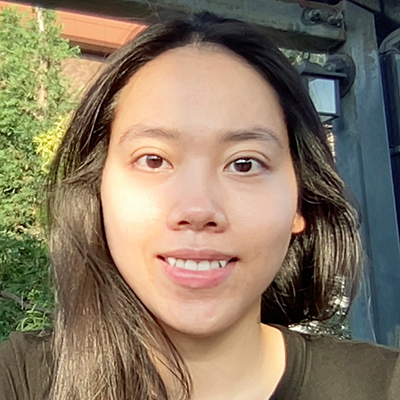
Name
MY Born in Vietnam
Department Name
Department of Contemporary Life Design
Career path after graduation
Honda Cars Asahikawa Corporation *As of May 2025
Why did you choose Koka?
I came to the open campus and had the impression that Koka was a beautiful university. I also thought that the two-year duration of the junior college and the content of study would suit me, so I chose it.
What was the best thing about Koka?
The best thing was the exposure I got to a variety of fields in my classes, which allowed me to broaden my perspective and deepen my thinking about my career. The scholarship program for international students was also very helpful. I also had many opportunities to communicate with Japanese students, and my Japanese became much more fluent. I was particularly interested in learning about traditional Japanese culture. I thought it was wonderful that the university is creating new values by inheriting long-standing traditions and connecting them to the modern world.
How is the support by our staff?
I became close to the teachers and they were like friends. Both the teachers and the staff were kind and supportive to me.
What was your most memorable experience as a student?
It is the experience of being able to grow as a person by challenging my own limits. Giving a presentation in Japanese in front of others, persuading others in group work. Every day, one by one, I was able to do what I thought I could not do, and now I am able to live with a better understanding of myself.
What did you do about employment and career paths?
I participated in the same job search activities for new graduates as Japanese university students. It is a very different process from Vietnam. I chose to work in the service industry to improve my foreign language skills and to serve customers. Anything after that, I will decide my career path depending on the situation at the time. I think Japan is a good environment for those who want to work hard and improve themselves.
What is the attraction of studying in Kyoto (Kansai)?
When it comes to studying in Japan, Kyoto is the place to be! The perfect combination of tradition and modernity is what makes Kyoto so appealing. In addition, Kyoto has many foreign and international student support groups and activities for foreigners. You can also enjoy visiting famous sightseeing spots such as Kinkakuji Temple during your vacation.
Open Campus Tours for International Students
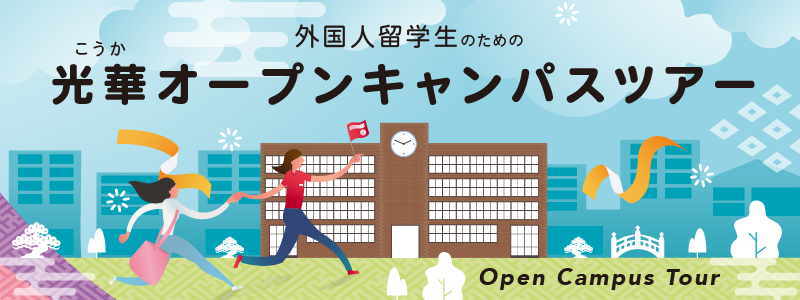
Experience Koka's campus life yourself by visiting mini-lectures and
booths while interacting with Japanese student staff !
Please contact the Center for International Programs if you wish to join.
CONTACT US
Kyoto Koka University
E-mail : kjmail.koka.ac.jp
Tel : +81-75-325-5304

Center for International Programs
Kyoto Koka University
38, Nishikyogoku Kadonocho,
kyo-ku, Kyoto-shi, Kyoto-fu, 615-0882, Japan
